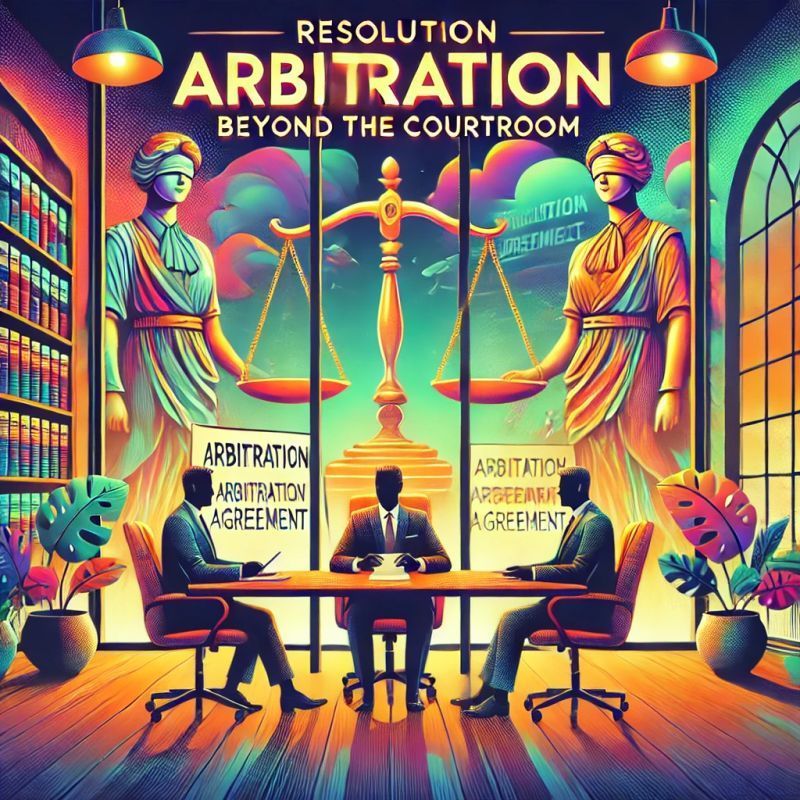Call our office today: (201) 503-5353
Blog Layout
Understanding Arbitration in Dispute Resolution
Arbitration is a popular form of alternative dispute resolution (ADR) that allows parties to resolve conflicts outside of the court system. Instead of a judge or jury, one or more impartial arbitrators decide the outcome, and their decisions are legally binding and enforceable in court.
Key points about arbitration:
Contractual Basis: Arbitration is only mandatory if agreed upon in a contract. Arbitrators' powers, including the ability to grant specific relief, come from the terms of the agreement.
Privacy and Flexibility: Arbitration proceedings are typically private and less formal than court trials. However, rules of evidence are more flexible, which may broaden the scope of documents and testimony considered.
Cost and Time: Arbitration is often perceived as faster and more cost-effective than litigation. However, depending on the arbitrator and case, costs can rise if the process is extended.
Limited Discovery: Arbitration may restrict the ability to gather extensive evidence, which can be a disadvantage for some parties.
No Jury or Appeals: There is no jury, and arbitrators' decisions are final, with limited rights to appeal. This can be beneficial or detrimental, depending on the situation.
Key considerations for effective arbitration clauses:
1) Scope of disputes subject to arbitration
2) Arbitration body selection and arbitrator qualifications
3) Location of the proceedings and applicable law
4) Number of arbitrators and relief they can award
5) Allocation of arbitration costs between the parties
The Federal Arbitration Act (9 U.S.C. § 1) governs arbitration at the federal level, while many states adopt versions of the Uniform Arbitration Act (UAA) or international arbitration principles such as the UNCITRAL Model Law.
Understanding the nuances of arbitration helps ensure dispute resolution provisions are fair, efficient, and tailored to client needs.

Share
Tweet
Share
Mail

By Joseph Perlow, Esq.
•
March 11, 2025
An LLC can grind to a halt when members disagree on a decision requiring consent—like a 50/50 split on a majority-consent matter. Without a clear resolution process, these disputes can lead to costly delays or litigation. To avoid this, LLC agreements can include deadlock-breaking mechanisms such as: -Mediation or arbitration. -Engaging a third party with relevant industry expertise. -Buy-sell provisions. Many agreements remain silent on deadlocks, assuming disputes will resolve informally or through litigation. In investment-holding LLCs, where a sponsor holds a majority interest and controls the board, deadlocks are rarely an issue since minority members often lack approval rights. Is your LLC agreement built to handle deadlocks? Let’s discuss.

By Joseph Perlow, Esq.
•
February 24, 2025
As an attorney, I'm often struck by the delicate balance between facilitating a client's entrepreneurial dreams and protecting them from potential risks. On one hand, it's exhilarating to work with innovators and game-changers who are passionate about bringing their vision to life. As their trusted advisor, I want to empower them to take calculated risks and push the boundaries of what's possible. On the other hand, it's my duty to consider the potential exposure and worst-case scenarios that could derail their progress. Walking this tightrope is one of the joys of working with startups and business owners as they grow!

By Joseph Perlow, Esq.
•
February 19, 2025
Imagine pouring water into a multi-tiered fountain. Each level must fill up before the overflow reaches the next. That’s exactly how a distribution waterfall works in investments—profits flow down in a structured order. Here’s the standard three-step waterfall: Return of Capital – Investors get back their initial investment before anyone profits. Preferred Return (Pref) – Investors receive a return (e.g., 8%) before profits are split. Profit Split – Remaining profits are shared, often favoring investors at first, with the sponsor earning a share like 75/25.

By Joseph Perlow, Esq.
•
February 10, 2025
Business contracts aren’t just about money—they define roles, responsibilities, and decision-making authority. When these details are missing, confusion leads to conflict. I recently saw a contract dispute arise because the agreement didn’t specify the roles of the members or the process for making key decisions. When a disagreement came up, there was no clear procedure to resolve it, leading to unnecessary friction and legal costs. A well-drafted contract could have prevented the entire issue. We make sure to clearly define each party’s role and establish a decision-making framework in your contracts. Clarity today avoids disputes tomorrow.

By Joseph Perlow, Esq.
•
January 30, 2025
Here are two of the most common questions I get asked—and the answers you need to know. 1- My tenant is a holdover. Can I evict them? If your tenant is paying rent and is not in material breach of the lease, you cannot evict them unless one of the statutory grounds under N.J.S.A. 2A:18-61.1 applies. New Jersey’s Anti-Eviction Act provides strong tenant protections, meaning you need a valid legal reason—such as non-payment of rent, lease violations, or certain other circumstances—to proceed with an eviction. 2- Can I evict a tenant if I want to live in the property? Yes, but only if the property is a three-family dwelling or less. Under N.J.S.A. 2A:18-61.1(l)(3), a landlord can evict a tenant if they intend to personally occupy the unit. However, the law requires you to provide the tenant with at least two months' written notice before filing for eviction, as stated in N.J.S.A. 2A:18-61.2(b). Have other eviction questions? Drop them in the comments or reach out.

By Joseph Perlow, Esq.
•
January 27, 2025
When bringing on investors, the first and most important concept to understand is equity—the ownership stake that investors receive in exchange for their capital. Equity represents a portion of your business, and giving it up means sharing ownership and, potentially, decision-making authority. In corporations, ownership is structured through stocks. Investors are issued shares of stock, representing their percentage of ownership. Stockholders may have voting rights, receive dividends, or both, depending on the type of stock (e.g., common vs. preferred). In LLCs (Limited Liability Companies), ownership is defined by membership interests, which work similarly to stocks in a corporation. Membership interests outline each investor's ownership percentage and determine their share of profits, losses, and possibly decision-making authority. Equity is more than just ownership; it’s a tool to attract the right investors, align incentives, and fuel growth while ensuring you retain enough control to achieve your long-term vision. Understanding how to structure equity deals can make the difference between a successful partnership and one that limits your business's potential.

By Joseph Perlow, Esq.
•
January 20, 2025
Here are the typical steps involved: Letter of Intent (LOI): Foundation for Negotiations: The LOI lays out the basic terms between the buyer and seller, serving as a precursor to the more binding purchase and sale agreement. It’s typically non-binding but critical for framing the negotiations. Purchase and Sale Agreement (PSA): This agreement outlines terms including the price, earnest money deposit, and specific conditions such as due diligence periods and closing conditions. An important aspect of the PSA is the Deposit. Soft Deposit: Initially, the deposit is kept as a "soft" deposit, which is refundable until the end of the due diligence period. This arrangement allows the buyer to withdraw based on findings during the due diligence without losing their deposit, providing a safeguard against unexpected property issues. Hard Deposit: After the due diligence period, the deposit becomes "hard" and is typically non-refundable. This marks the buyer’s firm commitment to proceed with the purchase, solidifying their financial engagement in the deal. Typically the PSA is prepared by the seller’s counsel, this document includes detailed schedules and exhibits that describe the property, leases, and service agreements, ensuring a transparent transaction. Due Diligence: Property Examination: The buyer inspects all aspects of the property thoroughly to ensure it fits their needs and complies with local laws. This includes reviewing the title report, survey, inspection and environmental reports and rent rolls. Closing: All key closing documents are prepared, negotiated, and reviewed to ensure accuracy and completeness. The closing process includes verifying that all legal requirements are met and that the documents are ready for recording at the local office, finalizing the transaction.

By Joseph Perlow, Esq.
•
January 10, 2025
An Operating Agreement serves as a critical framework for defining the governance, ownership, and operational procedures of a limited liability company (LLC). Whether for a single-member or multi-member LLC, a comprehensive agreement helps establish clarity and protect against disputes. Below are the key provisions to consider: Formation and Purpose. Establishes the legal formation, jurisdiction, and primary purpose of the LLC. Management Structure. Defines whether the LLC is managed by members or designated managers, detailing the authority and responsibilities of each. For manager-managed LLCs, identifies appointed managers and their scope of decision-making powers. Ownership and Capital Contributions. Clarifies the ownership interests and initial capital contributions of members and specifies the allocation of profits and losses. Also specifies the terms for additional capital contributions if the company requires further funding, along with potential penalties for non-compliance or failure to contribute. Tax Representation. Appoints the tax representative responsible for handling tax-related matters, including filings and audits. Distributions and Financial Reporting. Outlines the method for profit distributions and the company’s financial reporting practices. Identifies the accounting methods and fiscal year-end. Transfer of Membership Interest. Establishes the rules for transferring ownership interests and the process for admitting new members. Dissolution and Liquidation. Details the events that trigger dissolution and the procedures for liquidating assets and distributing proceeds. Indemnification and Liability Limitation. Provides liability protection for managers and members, subject to limitations for misconduct or gross negligence. A well-drafted Operating Agreement ensures operational stability and minimizes potential conflicts. By addressing governance, financial obligations, and exit strategies, it serves as a crucial document to support the long-term success of the business.

By Joseph Perlow, Esq.
•
January 3, 2025
New Jersey courts have long held that parties to a residential lease may treat utility charges, attorney's fees, and other costs related to an eviction as "additional rent" (Sudersan v. Royal, 386 N.J. Super. 246, 252). Without this specific language, you won't be able to evict a tenant for non-payment of these fees in a non-payment of rent action. Protect your rights and ensure your lease is airtight—this small detail can make all the difference.
Perlow Law LLC
Protecting & Maximizing
Clients' Interests & Potential
Contact Us
NJ OFFICE:
4 Brighton Road, Suite 204
Clifton, NJ 07012


